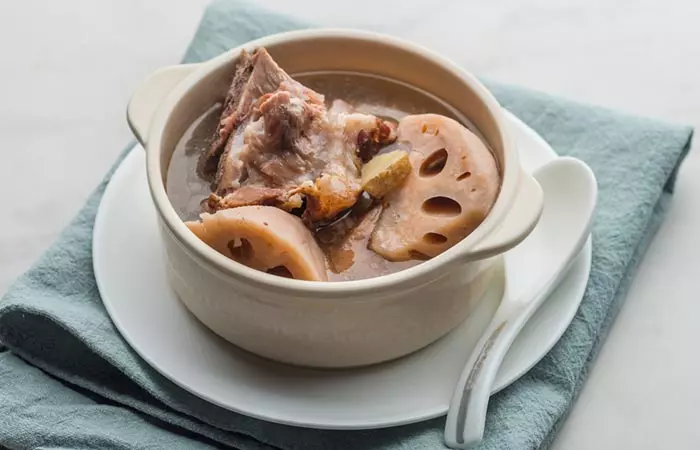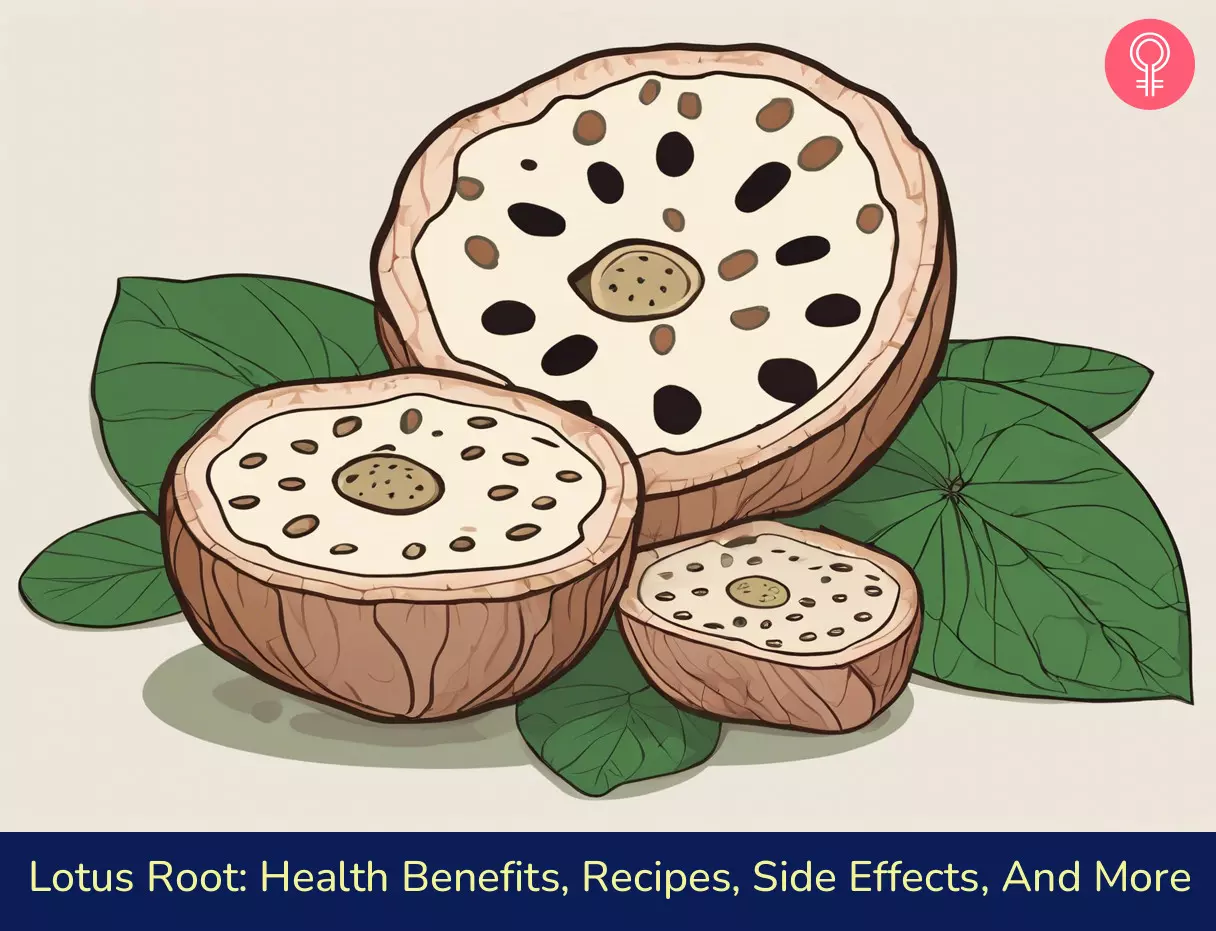This nutritional food source is used to add seasoning to foods and has several culinary applications too. This article explores the nutritional breakdown of lotus root, its health benefits, how to include it in your diet, and its possible side effects. Keep reading.
What Is Lotus Root?
Lotus (Nelumbo nucifera Gaertn.) belongs to the aquatic flowering plants family Nelumbonaceae. It is widely cultivated in China, Korea, Japan, and India as an ornamental plant for food and medicinal purposes (1). Lotus roots are its submerged stems. They are cylindrical and segmented (like connected sausages). The tubular roots have air channels running along their lengths, and when you cut them, you will see holes (2). What Are Its Benefits? It may help protect the liver, reduce inflammation, help manage diabetes and treat allergies. Who Can Use It? People who have fatty liver disease, digestive issues, and stomach ulcers. How Often? 2–3 times a week, or as recommended by your doctor. Caution Those with kidney disease may need to restrict their consumption of foods high in potassium, such as lotus root.
Elliot Reimers, CISSN, CNC, says, “Lotus root is a plant mostly found in lakes and rivers. There are a number of uses to the lotus root in regards to medicine, and almost the entire plant has different medicinal qualities.” The roots of its use in traditional medicine could be traced to its nutritional value.
Lotus Root Nutritional Information
A hundred grams of cooked lotus root contains (3): Reimers adds, “The fiber that comes from the lotus root has been said to help our bodies with the regulation of blood sugar and can also help improve our digestion.” Here are some other reasons to eat lotus root.
Health Benefits Of Lotus Root
1. May Protect The Liver
A mice study found that oral lotus root powder could prevent non-alcoholic fatty liver disease. Researchers found that lotus roots could suppress inflammatory gene expression associated with the condition, increase serum adiponectin levelsi A measurement of adiponectin, a hormone released by the fat tissue that helps regulate insulin in the body and fights inflammation. , and protect the liver (4). Fermented lotus root extract may improve liver detoxification capacity and repair the liver cells damaged due to alcoholism. It may have a therapeutic effect on acute alcoholism issues (5).
2. May Protect Against Stomach Ulcers
A study on rats showed that fermented lotus root could protect the stomach against stomach ulcers. It has antioxidant and anti-inflammatory properties that add to its gastroprotective effects and speed up the recovery of the mucous layer of the stomach (gastric mucosa) (5).
3. May Reduce Inflammation
Fermented lotus roots contain linoleic acid. This fatty acid can reduce inflammatory responses within the body by regulating the immune system and help prevent acute inflammatory conditions like acute hepatitisi A medical condition in which the liver is inflamed, impeding normal functioning, such as blood filtering and resisting infection. and autoimmune diseasesi Diseases in which the immune system fails to differentiate between foreign and own cells, causing it to damage healthy cells. (6).
4. May Help Manage Diabetes
An animal study found that lotus root extract could significantly reduce blood sugar levels in diabetic and normal rats. Researchers also observed improved glucose tolerance and insulin action (7). Consuming lotus root extract may have a similar effect in humans. However, more human studies are required to substantiate the effect.
5. May Treat Allergy
A mice study found that lotus root powder could reduce nasal allergy symptoms in mice. It contains vitamin C and other polyphenolic compounds that can reduce serum histamine (a compound released by cells that triggers allergic reactions) levels and other inflammatory parameters (8).
6. May Promote Gut Health
Lotus roots are a good source of dietary fiber. A fiber-rich diet promotes regular bowel movements and increases fecal weight and frequency (9).
7. May Control Weight Gain
Lotus root extract can reduce fat tissue weight (adipocytes) and have anti-obesity effects in human cells. It prevents lipid accumulation in cells and may lower blood cholesterol levels (10). This may also help prevent obesity-related conditions.
8. May Promote Heart Health
Potassium in the roots helps to reduce the bad LDL cholesterol by acting as a great vasodilatori Medications used to dilate blood vessels, which eases the flow of blood and relieves blood pressure. . It also prevents arteries from clogging up and reduces the risk of heart attacks. Pyridoxine in lotus roots helps manage homocysteine levelsi Refers to the level of homocysteine (an essential amino acid) in the body, which indicates vitamin deficiencies. in the blood and protects the heart. High homocysteine levelsi Refers to the level of homocysteine (an essential amino acid) in the body, which indicates vitamin deficiencies. in the blood damage the lining of the arteries.
9. May Help Reduce Stress
Vitamin B complex, especially pyridoxine in the lotus root, interacts with neural receptors of our brain and may help reduce stress, irritability, and headaches. Reimers says, “Some of the other reasons lotus root is good for you include that it’s not a common food allergen, it has a low water footprint, and it is naturally gluten-free.” Also, it contains vitamin B and C, which are essential for healthy skin and hair. These benefits make it worthwhile to include lotus root in your diet. Here’s how you can do it.
How To Add Lotus Root To Your Diet: Popular Recipes
Lotus root is mildly sweet and has a crunchy, starchy texture. As it cooks, it softens without losing its crunch and flavor. The vegetable is versatile – it is crisp when stir-fried and tender and creamy when baked. You cannot consume raw lotus roots as they increase the chance of bacterial infections; you need to either boil or steam them. Peel off its skin and rinse it thoroughly before boiling for 10 minutes. However, if you want to soften its texture, boil the roots for not more than 20 minutes. Here are a few recipes to try.
1. Lotus Root Stir-Fry
Make your lunchtime a little more exciting with this savory side dish. What You Need
300 g lotus root 1 cup of mushrooms (chopped) ½ cup of red bell pepper (chopped) ¼ cup of chicken stock 2 teaspoons of oyster sauce ¼ teaspoon of sugar 1/8 teaspoon of white pepper 2 tablespoons of oil 6 slices of ginger 2 garlic cloves (minced) 2 scallions (chopped) 1 tablespoon of dry sherry 2 teaspoons of cornstarch Salt, as needed
How To Prepare
2. Baked Lotus Root Chips
Replace the potato chips with this tasty snack! Create your flavor by mixing different spices. What You Need
200 g lotus roots 1 teaspoon of black pepper (freshly ground) ½ tablespoon of salt 2 tablespoons of olive oil
How To Prepare
3. Pork And Lotus Root Soup
This hearty, flavorful soup will satisfy your soul and hunger. What You Need
500 g lotus root 500 g pork ribs 100 g peanuts 1 carrot (peeled and chopped) 1 dried cuttlefish, rinsed (optional) 8 dates (dried, deseeded) Salt, as needed
How To Prepare Krista Goon, a blogger, shared her insight on storing the lotus root soup in her blog. She said, “While I like lotus root soup, it doesn’t freeze well (i).” She added, “I usually make a large pot of soup and freeze the leftover portions in individual containers. If you freeze lotus root, its texture crumbles. When you reheat the soup, the soup still tastes great but the lotus root won’t be as lovely to bite into!”
4. Stuffed Lotus Root
Ingredients
1 stem of lotus root 1 teaspoon of light soy sauce ½ cup of minced pork 1 tablespoon of whisked egg A pinch of salt A dash of pepper Chopped green onion for garnishing
How To Prepare It is always best to consume fresh lotus roots. However, you can also store them for later use. Here are a few tips.
Tips To Store Lotus Root
You can refrigerate lotus roots for up to a week. Ensure to store peeled and sliced roots in an airtight container. Sliced lotus roots are prone to browning. You can soak them in vinegar to prevent browning. Discard the roots if they develop black spots or an unpleasant smell. Lotus roots are delicious and healthy. However, you have to be careful while consuming them.
Side Effects And Allergies
Though it is rare, people can be allergic to lotus roots. There has been a case where a 6-year-old girl experienced allergic reactions after consuming fried lotus roots (11). Reimers adds, “Some of the possible side effects of lotus root include bad breath, fever, diarrhea, and problems with the liver. While it is plant-based and has many health benefits, individuals should speak with their doctor before incorporating it into their diet too quickly.” Does lotus root make you sleepy? Yes. As per studies, oral administration of 150 mg/kg of lotus rhizome water extract helps promote sleep (12). Does lotus raise blood pressure? No. Anecdotal evidence suggests that the presence of potassium (a vasodilatori Medications used to dilate blood vessels, which eases the flow of blood and relieves blood pressure. ) in lotus roots helps relax blood vessels and reduce their contraction. This, in turn, may lower blood pressure levels. However, limited studies are available in this regard. Does lotus tea make you poop? The dietary fiber in lotus tea may bulk up the stool and promote bowel movements. However, more research is warranted in this regard. Is lotus root keto-friendly? No. Lotus root is not keto-friendly due to its high carb values. According to the USDA, 100 grams of lotus root contains 15.5 g of carbs (3).
Illustration: Lotus Root: Health Benefits Recipes Side Effects And More
Learn about the amazing benefits of lotus root! Watch this video to discover its nutrient facts and how it can help improve your health.












